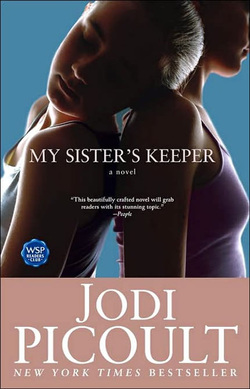
Title: My Sister's Keeper
Author: Jodi Picoult
Genre: Fiction
# pages: 448
Date published: 2005
5-star rating: 3 stars
Would you recommend it: Yes
My Sister’s Keeper: it’s a title I’ve heard over and over in the last five years, from insistent urgings from my family and friends to read the “outstanding” novel, countless utterings of, “Oh my gosh, you haven’t read that?! Well at least tell me you’ve seen the movie.” I even received a copy for my birthday, and then when it was lost somewhere in the black hole that is my room, received another for Christmas. This winter break I finally took the plunge; the time had come for me to read the book that was beloved by millions, if only to stop the constant pressings of my mother.
My Sister’s Keeper is the story about two sisters: Anna, conceived in order to be a bone marrow donor for her sister Kate, who was diagnosed with leukemia. But it does not end there. By age thirteen, Anna has undergone countless surgeries, transfusions, and other medical procedures all to save the life of her sister. Anna has never had a choice in any of these procedures—until now. This novel is primarily a story about family, pain, and the coming-of-age of a young girl who is not sick but might as well be.
I flew through this book; in fact, I couldn’t put it down. Jodi Picoult’s writing flows so easily and poetically, it completely absorbs the reader in the story, making it difficult to think about anything else.
That being said, I wasn’t blown away by My Sister’s Keeper. Perhaps it was the constant ravings of my family and friends that ballooned my expectations, setting the bar too high for any book to reach. Or maybe it simply isn’t an exceptional novel. I know this opinion is an unpopular, but let me explain. The idea behind the novel is definitely captivating and unique, but I found it to be improbable, even contrived. I could almost see Jodi Picoult’s mind at work, as she sat at her writer’s desk, crafting the story. As with poor acting in films, a contrived plot in a novel takes away the magic and the feeling that what you are reading, or watching on the big screen, is real.
Another complaint I have with My Sister’s Keeper is the dialogue. The profound musings of thirteen-year-old Anna seem too mature, not in a precocious way, but in a way that seems unrealistic and distracts from the novel. All the characters seem to speak in this same, highly intelligent voice, which suggests that Picoult simply gave each character her own voice and did not even try to distinguish between the differences in their ages or gender.
Overall, My Sister’s Keeper is a quick, well-written read that will entertain and engage. Even so, it doesn’t deserve the endless hype and fanfare that is has received in recent years; let along a major motion picture. Perhaps if this novel was less publicized and less popular, and I had lower expectations, this review would have been different. But sadly, I was disappointed.
Review by Brittany Duncan, A&S '16

 RSS Feed
RSS Feed
